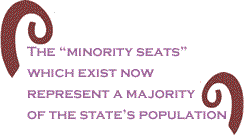The
California Citizens Redistricting Commission (CCRC) will
be voting to release the final iteration of the redistricting
maps this week.  These
maps are supposed to reflect the state�s demographic shifts
in the state�s population after the reapportionment of state
and congressional legislative seats following the 2010 Census. These
maps are supposed to reflect the state�s demographic shifts
in the state�s population after the reapportionment of state
and congressional legislative seats following the 2010 Census.
As
far as the congressional seats go, the goal of the collective
African American community statewide is to hold on to what
it has, despite a population that is in decline. Blacks
in California,
according to the 2010 Census, represent 6.2% of the state�s
population, or 2.3 million (out of 37 million residents)
who identify themselves as being of African American descent.
That is down from being 7.65% of the state�s population
after the 2010 Census. California�s
black population is the largest African American population
in the west, and the fifth largest in the nation. Of California�s
53 congressional districts, African Americans hold four,
or 7.5% of the seats (proportional to its percentage in
the 2000 Census population). The CCRC now claim that Blacks
are OVER represented in the state�s Congressional delegation.
Their mindset is being reflected in the maps released so
far.
The
latest float of the CCRC�s district maps, seats historically
held by African American representatives, commonly referred
to as �the BLACK seats,� have fewer blacks in those districts,
making it much more difficult to continue the legacy of
black representation. In the most dramatic scenario, two
of the seats are merged into one, creating a majority black
district, but losing a �black� seat in the process. Relegating
the statewide African American community to three seats,
Southern California, more specifically
Black Los Angeles, is set to take the hit. Now one of the
most progressive black populations in the nation finds itself
on the verge of being disenfranchised. Some people think
we, the African American community, are being a little too
sensitive. Huh?
Well,
how should we feel about it? Political representation that
we�ve fought (and died) for is about to be taken away on
questionable population premises that include undocumented
aliens and historical gerrymandering.
 With
its population in decline, CCRC rationalization is stating
that the emerging Latino and Asian populations have grown
and this has put the squeeze on black representation. I
don�t necessarily buy that, for a number of reasons. Black
population hasn�t declined that much. 2020, the seat may
be gone for sure, but blacks have to retain political power
to address to dramatic political interests at hand, namely
unemployment and reentry, which I wouldn�t trust anybody
else to handle. For those reasons alone, congressional representation
must be retained. I�m more inclined to think it�s a power
grab from which blacks in the state may never recover. With
its population in decline, CCRC rationalization is stating
that the emerging Latino and Asian populations have grown
and this has put the squeeze on black representation. I
don�t necessarily buy that, for a number of reasons. Black
population hasn�t declined that much. 2020, the seat may
be gone for sure, but blacks have to retain political power
to address to dramatic political interests at hand, namely
unemployment and reentry, which I wouldn�t trust anybody
else to handle. For those reasons alone, congressional representation
must be retained. I�m more inclined to think it�s a power
grab from which blacks in the state may never recover.
The
CCRC is playing with our community�s representation over
a one percent differential in population percentage. Black
Congressional representatives would go from four to three,
or 5.6% of the state�s congressional representation. So
they would rather us be underrepresented by one percent
(5.6%) than overrepresented by one percent (at 7.5%). If
population parity is the play, why does the CCRC still have
over 60% of the congressional seats represented by white
people when they are only 40.1% of the state�s population?
I�ll
tell you why, it�s because of the way the lines are drawn
and that effect on majorities, namely blacks and Latinos
that are clustered in urban areas. That�s the fallacy of
the population parity argument. Whites can represent other
people, but other people can�t represent whites. So, the
�minority seats� which exist now represent a majority of
the state�s population. The commission is playing black
and Latino political interests against each other and marginalizing
Asian political interests in favor of the historical political
status quo. We must call this out or it will continue.

It�s
power that the black community cannot afford to concede.
And so the commission must know the level of alarm our community
has for its district maps and be encouraged to change them.
Frederick Douglass� words never have rung truer:
�Power
concedes nothing without a demand. It never has and it
never will.�
If
the Los Angeles black community doesn�t demand the commission retain black
political representation in Congress, it will concede black
political representation in Congress. It is as simple as
that. That�s how power shifts from one group to the next.
BlackCommentator.com
Columnist,
Dr. Anthony Asadullah Samad, is a national columnist, managing
director of the
Urban Issues Forum
and author of
Saving The Race: Empowerment Through Wisdom. His Website is AnthonySamad.com. Click
here
to contact Dr. Samad.

|

